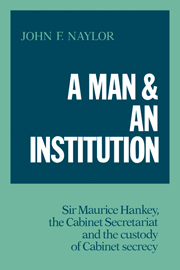 A Man and an Institution
A Man and an Institution Book contents
6 - Hankey's last years
Published online by Cambridge University Press: 30 March 2010
Summary
If Sir Maurice Hankey needed a reminder that a recurrence of the disclosure of Cabinet business which had followed the Great War would undermine the secrecy built round that body in the post-war years, the exchange with Lloyd George surely served that purpose. Yet during that time his attempts to gain Cabinet Office custody of the papers of outgoing administrations had met with frustration. In 1934 the story proved to have quite a different ending, as the National Government acted upon the Secretariat's request to regain custody of those Cabinet papers. Though Hankey of course needed Cabinet approval to initiate his ‘paper’ campaign, the mandate for governmental secrecy generally had strengthened of late: in particular, the Official Secrets Act had emerged from the shadows of its post-war revision – in 1920 undertaken almost entirely as a means of combating espionage and terrorism – as legislation with broad implications for the maintenance of government secrecy.
On one occasion in 1925, the Home Office had threatened prosecution, citing section 6 of the Official Secrets Act, brought against the author of a book about the Anglo-Irish patriot, Roger Casement, executed for treason in 1916; the book was based in part upon diaries which the government refused to allow publication, then and for decades to come. The Home Secretary, Sir William Joynson-Hicks, cited the situation in Ireland as the rationale for his decision; when the would-be author countered that future Home Secretaries might feel differently, ‘Jix’ countered with a determination that his successors were to share for a half-century: ‘but the Act remains.’
- Type
- Chapter
- Information
- A Man and an InstitutionSir Maurice Hankey, the Cabinet Secretariat and the Custody of Cabinet Secrecy, pp. 210 - 265Publisher: Cambridge University PressPrint publication year: 1984


